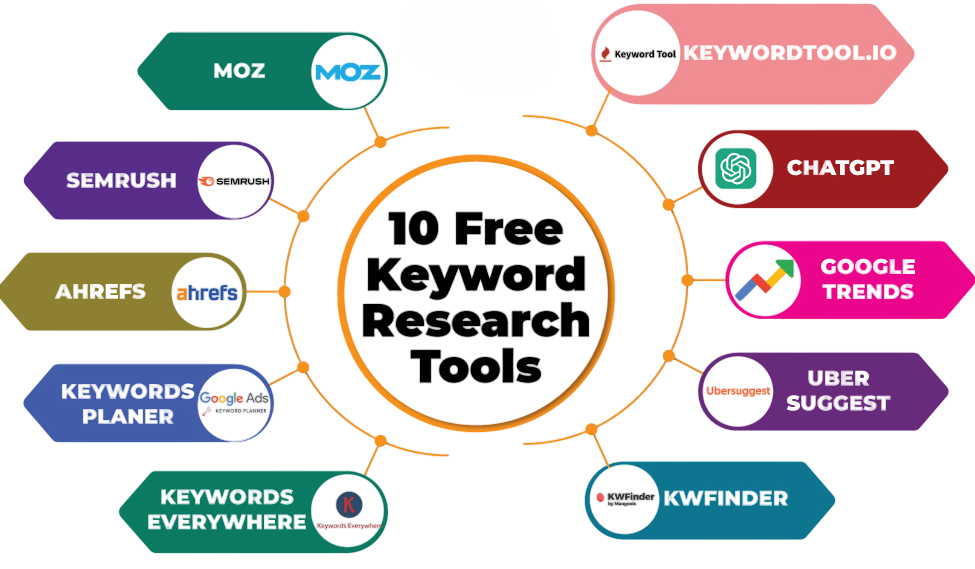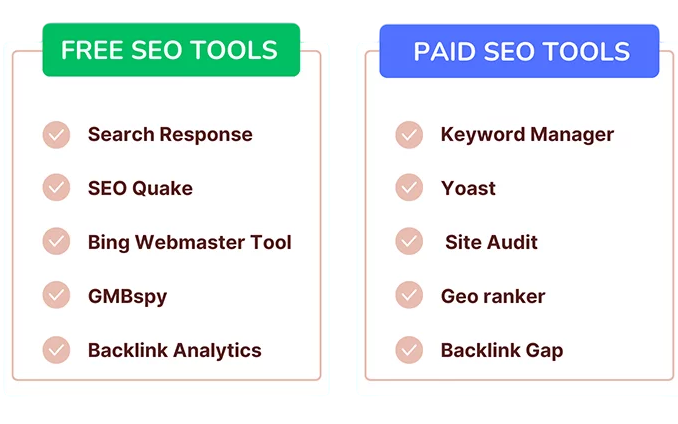
- Importance of Using SEO Tools
- Keyword Research Tools (e.g., SEMrush, Ahrefs)
- On-Page SEO Tools (e.g., Yoast)
- Technical SEO Tools (e.g., Screaming Frog)
- Rank Tracking Tools
- Backlink Analysis Tools
- Competitor Research Tools
- Site Audit Tools
- Local SEO Tools
- Chrome Extensions for SEO
- Free vs. Paid Tools
- How to Choose the Right Tool
Importance of Using SEO Tools
SEO is a multifaceted discipline that can be overwhelming without the proper support. SEO tools serve as strategic assistants, simplifying complex processes and providing insights that would otherwise require hours or days to uncover manually. Whether it’s understanding why traffic dropped suddenly or which keywords offer the most potential, these tools empower marketers to make data-driven decisions core competencies emphasized in Digital Marketing Training, where learners master analytics platforms, traffic diagnostics, and keyword opportunity analysis to refine strategy, recover visibility, and optimize performance across search and social channels. They enable users to audit their websites, track SEO metrics over time, identify broken links, and stay informed about the latest algorithm updates. In short, SEO tools enhance productivity, accuracy, and overall performance in digital marketing strategies.
Ready to Get Certified in Digital Marketing? Explore the Program Now Digital Marketing Online Training Offered By ACTE Right Now!
Keyword Research Tools (e.g., SEMrush, Ahrefs)
- Keyword research is the foundation of any successful SEO strategy. Without targeting the right keywords, a website may fail to attract the right audience. Tools like SEMrush, Ahrefs, Ubersuggest, and Google Keyword Planner help marketers identify high-volume keywords essential inputs for Content Distribution, where strategic keyword targeting ensures that blogs, videos, and infographics reach the right audience across search engines, social platforms, and syndication networks. These tools empower creators to align content with user intent, boost visibility, and maximize engagement across channels. These low-competition keywords are relevant to their niche.
- These tools also provide data on keyword trends, search intent, and related terms. SEMrush and Ahrefs go further by offering competitor keyword analysis, helping you uncover the keywords your competitors are ranking for. This enables marketers to optimize their content and align their strategies with user search behavior, resulting in increased visibility and engagement.

On-Page SEO Tools (e.g., Yoast)
- On-page SEO refers to optimizing individual web pages for higher search engine rankings and a better user experience. Tools like Yoast SEO, Rank Math, and All in One SEO Pack are particularly popular among WordPress users. These plugins provide real-time suggestions for optimizing title tags, meta descriptions, headings, and keyword usage.
- They also help in managing schema markup, canonical URLs, and social media previews. With intuitive checklists and readability scores, On-page SEO tools make it easy even for beginners to follow best practices and ensure every webpage is optimized for both users and search engines.
- SEO is not done in a vacuum. To stay competitive, it’s essential to understand what your rivals are doing. Competitor research tools provide insights into competitors’ keywords, backlinks, top-performing content, and traffic sources. Tools like SpyFu, Ahrefs, and BuzzSumo help you uncover which strategies are working for others in your niche.
- For example, by identifying a competitor’s most shared blog post or highest-ranking keyword, you can create similar or improved content to capture audience attention. Competitive intelligence allows you to find content gaps, leverage untapped keywords, and refine your overall SEO plan.
- Periodic site audits are necessary to maintain website health and ensure compliance with SEO best practices. Site audit tools, such as SEMrush Site Audit, Screaming Frog, DeepCrawl, and Google Search Console, scan your website for errors and generate actionable reports.
- These tools evaluate hundreds of SEO parameters, including site architecture, page speed, mobile usability, duplicate content, and other key factors that impact search engine rankings. Regular audits help prevent penalties, enhance user experience, and improve crawl efficiency. Most tools also categorize issues based on severity, enabling teams to prioritize fixes according to their impact.
- While there are many free SEO tools, such as Google Analytics, Google Search Console, and Ubersuggest, they often come with limitations in terms of data depth, user access, or features. On the other hand, paid tools such as Ahrefs, SEMrush, and Moz Pro offer extensive capabilities, including advanced reports, competitor tracking, content audits, and historical data.
- For small businesses or individuals just starting out, free tools may suffice. However, larger organizations or serious SEO professionals usually require paid tools to gain a competitive edge. Choosing between free and paid depends on your goals, budget, and the complexity of your website.
To Explore Digital Marketing in Depth, Check Out Our Comprehensive Digital Marketing Online Training To Gain Insights From Our Experts!
Technical SEO Tools (e.g., Screaming Frog)
While on-page and keyword optimization focus on content, technical SEO concentrates on backend elements that impact crawlability and indexing. Tools like Screaming Frog SEO Spider, Google Search Console, and Sitebulb help identify issues such as broken links, duplicate content, missing tags, redirect chains, and other common problems. Screaming Frog is particularly powerful, as it crawls entire websites and generates detailed reports that highlight all technical flaws a capability leveraged by Big Brands Transforming Experience, where enterprise teams use deep crawl diagnostics to uncover broken links, duplicate content, metadata gaps, and structured data errors. These insights fuel large-scale optimizations that enhance search visibility, user experience, and digital performance across complex web ecosystems. These tools are invaluable in ensuring that search engines can access, crawl, and index your site efficiently, which in turn improves visibility and user experience.
Rank Tracking Tools
Monitoring how your website ranks for targeted keywords is essential to measuring SEO success. Rank tracking tools like SERPWatcher, AccuRanker, Moz Pro, and SE Ranking help you track keyword positions across different devices and locations core functionalities explored in Digital Marketing Training, where learners gain hands-on experience with SERP analysis, mobile vs desktop performance tracking, and location-based keyword visibility to refine strategy, benchmark competitors, and optimize campaigns for targeted reach. They provide daily updates, historical trends, and alerts for sudden changes. These insights enable marketers to assess the impact of SEO efforts, identify declining rankings, and take timely corrective action. Some tools also allow you to track competitors’ rankings, giving you a strategic advantage in the ongoing SEO race.
Looking to Digital Marketing Training? Discover the Digital Marketing Expert Masters Program Training Course Available at ACTE Now!
Backlink Analysis Tools
Backlinks remain one of the most important ranking factors for search engines. However, not all backlinks are beneficial; some can harm your rankings if they come from spammy or irrelevant sources. Backlink analysis tools, such as Ahrefs, Majestic, SEMrush, and Monitor Backlinks, provide detailed information about your backlink profile, including the number of links, referring domains, anchor texts, and domain authority. These tools also help identify toxic links that may need to be disavowed and reveal opportunities for link-building through competitor analysis. Maintaining a healthy backlink profile is essential for enhancing domain authority and driving organic traffic.
Competitor Research Tools
Preparing for Digital Marketing Job Interviews? Have a Look at Our Blog on Digital Marketing Interview Questions and Answers To Ace Your Interview!
Site Audit Tools
Local SEO Tools
For businesses targeting specific geographic locations, local SEO tools are indispensable. Tools like Moz Local, BrightLocal, and Yext help manage local citations, business listings, and Google Business Profiles. They ensure that your name, address, and phone number (NAP) are consistent across directories, which improves local search visibility a foundational tactic emphasized in Local SEO Tips To Rule Google Maps, where businesses learn to audit citations, correct discrepancies, and maintain uniformity across platforms like Google Business Profile, Yelp, Facebook, and Apple Maps. NAP consistency builds trust with search engines and boosts your chances of ranking in the coveted Local Pack. These platforms also provide insights into customer reviews, local keyword rankings, and competitor performance in the area. With mobile searches like “near me” growing rapidly, local SEO tools are key to attracting foot traffic and boosting conversions for local businesses.
Chrome Extensions for SEO
Chrome extensions provide quick access to powerful SEO features directly in your browser. Popular options include SEOquake, MozBar, Keywords Everywhere, Check My Links, and Google Page Analytics. These tools offer on-the-fly analysis of web pages, displaying metrics such as domain authority, meta tags, heading structure, and keyword density core capabilities explored in Digital Marketing Certification Process, where learners gain hands-on experience with technical SEO audits, content diagnostics, and performance benchmarking. Mastering these tools equips professionals to identify flaws, optimize structure, and improve visibility across search engines. They are handy for marketers who need to perform quick audits, competitor checks, or keyword lookups while browsing the web. Chrome extensions are not as comprehensive as standalone tools, but they offer convenience and speed for everyday tasks.
Free vs. Paid Tools

How to Choose the Right Tool
With hundreds of SEO tools available, choosing the right ones can be challenging. The best approach is to start by identifying your goals, whether it’s improving On-page SEO, managing technical issues, or boosting local visibility. Then evaluate tools based on ease of use, data accuracy, customer support, integration capabilities, and pricing. Most premium tools offer free trials, allowing users to test their features before making a commitment a practical entry point emphasized in Digital Marketing Training, where learners explore platforms like SEMrush, Ahrefs, Moz, and KWFinder to master SEO, PPC, and content strategies. Trial access helps trainees gain hands-on experience, compare tool capabilities, and build confidence before investing in long-term subscriptions. It’s also wise to use a combination of tools, as no single platform covers every aspect of SEO. For instance, you might use Google Search Console for indexing issues, Ahrefs for backlinks, and Yoast for on-page optimization. By strategically selecting tools that complement each other, you can build a robust and efficient SEO toolkit. A Midsummer Night’s Dream by William Shakespeare explores love, marriage, and the expectations of society. In this essay, we will examine how the play portrays marriage as both limiting and challenging, yet ultimately worthwhile. Commensurate with its origins in a court marriage, this drama speaks throughout for a sophisticated Renaissance philosophy of love in both its rational and irrational forms. This is illustrated by the fact that a significant disparity existed in the expectations placed on men and women. Hermia embodies this struggle as she defies her father Egeus’s wishes to marry Demetrius, showcasing her desire for autonomy and true love rather than just fulfilling only her duty to her society. This discussion is outside the core scope of SEO tools and their importance.




